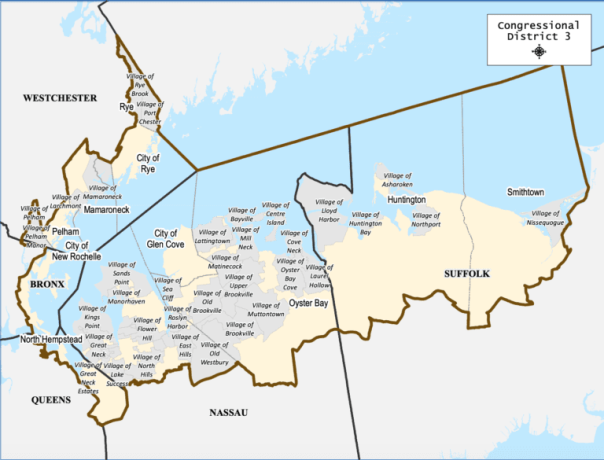New York’s Court of Appeals rejected maps with newly-drawn congressional lines that were believed by some to favor Democratic candidates last week.
Judges on the appeals court said the congressional lines were gerrymandered and, therefore, in violation of a 2014 constitutional amendment to deter such redistricting so that one party is favored.
Earlier this year, Patrick McAllister, a state Supreme Court judge, rejected the maps saying they were “unconstitutionally drawn with political bias.”
Some of the changes in the previously-approved Congressional maps included the state’s 3rd District stretching into parts of the Bronx and Westchester counties.
Currently, the district, held by U.S. Rep. Tom Suozzi (D-Glen Cove), who is now running for the Democratic nomination for governor, includes Manhasset, Roslyn, Port Washington, Great Neck and Floral Park, among other areas, and stretches from Whitestone, Queens, to Kings Park in Suffolk County.
The proposed redistricting would add several areas in Westchester County and the Bronx.
Melanie D’Arrigo, a candidate for the Democratic nomination in the district, previously criticized the layout of the new district in a statement and claimed the proposed lines are an example of “extreme” gerrymandering. D’Arrigo, last week, called for the primary date to be rescheduled while the state continues to determine what constituency candidates will serve if elected.
“If we are truly committed to running a free and fair election, we can’t stop overturning the unconstitutional gerrymander,” D’Arrigo said in a statement. “In order to center the needs of our voters, the primary date must be extended to account for the logistics of a new Congressional map.”
Robert Zimmerman, a fellow Democrat running against D’Arrigo in the 3rd district election, said whatever redistricting occurs will not deter him from fighting for his constituents and addressing issues such as climate change.
“Regardless of yesterday’s court ruling and how the district lines will be redrawn, I am in this fight because the issues facing our communities and the nation remain of paramount importance,” Zimmerman said last week.
Nassau County Legislator Josh Lafazan (D-Woodbury) and former North Hempstead Supervisor Jon Kaiman, also Democratic candidates in the 3rd district, echoed Zimmerman’s sentiments.
“No matter the communities that end up in #CD3, I’m going to continue campaigning to provide more affordable healthcare, less taxes, safer neighborhoods and to take care of our seniors and veterans, and that’s not going to change,” Lafazan tweeted.
“With so many challenges to confront at home and abroad, our democracy depends on experienced leaders to answer the call to serve,” Kaiman said.
George Santos, the Republican nominee in the election, said the vote stopped the “Democrats’ attempt to cheat and rig the upcoming election,” in a tweet last week.
Jay Jacobs, chairman of the state’s and Nassau County’s Democratic Committees, told the New York Post that he remains “confident” of Democratic victories in the upcoming November elections, despite what lines are redrawn and ultimately approved.
While certain district lines may change, what does not change is our party’s record of results which contrasts clearly with the Republican Party’s radical agenda to drag this state backward,” Jacobs told the Post.
Efforts to reach Jacobs for comment were unavailing.
Gov. Kathy Hochul signed legislation that required county redistricting to follow guidelines that aim to promote fairness and not favor parties. The legislation states that district lines must consist of contiguous territory, be drawn nearly equal in population as is practicable, promote orderly and efficient election administration and not be drawn with the intent to deter certain minority groups from participating in elections.
“As bad actors across the country work to undermine public faith in our electoral institutions, the importance of clear and uniform rules to govern political representation has never been more critical,” Hochul said. “This law will ensure the entirety of our state is governed by rules that are derived directly from the federal and state constitutions and ensure the right to equal participation in our political process.”

